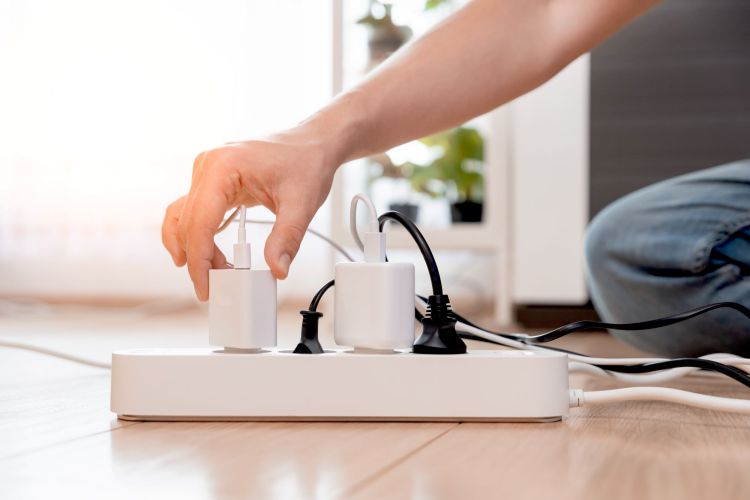 There’s no denying the significance of electricity, which many people rely on to carry out daily tasks and power their homes. It has become a crucial part of modern living, whether used to operate your appliances, light up your home, or charge your electronic devices.
There’s no denying the significance of electricity, which many people rely on to carry out daily tasks and power their homes. It has become a crucial part of modern living, whether used to operate your appliances, light up your home, or charge your electronic devices.
However, it would help if you also recognized its potential dangers. When not handled properly, electricity can cause serious injury or even death. Thus, as homeowners, you must understand the importance of practicing electrical safety and taking the necessary precautions to prevent accidents.
This homeowner’s guide to electrical safety provides practical tips and advice for keeping your home safe from electrical hazards. Read on to learn more about it.
-
Regularly Inspect Your Electrical System
Like the other aspects of the house, your electrical system will need regular inspection and maintenance. The routine inspection lets you detect any potential or minor electrical issues and have them repaired immediately before it’s too late.
Check all the outlets in the house and the breakers in the breaker box. Look for signs of wear or damage, like loose connections, frayed wires, or broken outlets. You must also use your sense of smell to inspect your electrical system. If you suddenly smell something burning or foul, particularly from one of your outlets or appliances, immediately refrain from using them until checked by a qualified electrician.
Other signs to look out for when inspecting your electrical system are:
- Sparks from an appliance or outlet
- Hot outlets or switch plates
- Dimming or flickering lights
- Strange buzzing sound from the outlet or fuse box
If you detect these signs, call a professional electrician immediately. You may check out thelocalelectrician.com.au/areas/ or other electrical repair services in your local area to schedule the earliest appointment possible. All these signs are potential hazards that require to be fixed ASAP.
-
Refrain From Overloading Your Circuits
Overloading circuits is a common issue in many households. But did you know that it’s one of the common causes of residential fires? When too many electrical appliances are connected to a single circuit, it can cause the circuit to overload and overheat, potentially leading to a fire.
One of the warning signs of an overloaded circuit is flickering, blinking, dimming lights, and frequently tripped circuit breakers or blown fuses. Buzzing light switches, humming outlets, and warm or discolored wall plates are common signs of an overloaded circuit.
If you detect any of these signs, disconnect all the devices plugged into that circuit or switch off the breaker for that outlet to avoid further complications. Then, contact a certified electrician to diagnose and fix the issue before it leads to electrical fires.
-
Only Use Certified Electrical Products
When it comes to electrical products, it’s essential to use certified ones. Certified electrical products are tested and evaluated against rigorous safety standards, ensuring they meet specific electrical safety requirements.
So, ensure you’re using certified electrical products like cords, outlets, and switches to reduce the risk of electrical hazards. You may also get the help of a professional electrician to help you find some high-quality and certified electrical products.
-
Install Ground Fault Circuit Interrupters (GFCIs)
 GFCIs are electrical safety devices that protect your home against electrical shock and electrocution. These devices are invented to automatically shut off the electrical circuit when it detects a ground fault. This quick response can minimize or even eliminate the risk of electrical shock, potentially saving someone’s life.
GFCIs are electrical safety devices that protect your home against electrical shock and electrocution. These devices are invented to automatically shut off the electrical circuit when it detects a ground fault. This quick response can minimize or even eliminate the risk of electrical shock, potentially saving someone’s life.
Ensure you have GFCIs installed in your home, especially in areas with water (e.g., bathroom, kitchen, basement).
It’s also important to note that GFCIs require regular maintenance and testing to ensure continued functionality. Homeowners should test their GFCI outlets monthly to ensure they’re working properly.
-
Keep All Electrical Equipment And Devices Away From Water
Water and electricity do not mix, as the combination can lead to electrical fires, electrocution, and appliance damage. Thus, a sink, bathtub, or swimming pool should be at least five feet away from any electrical appliance.
Additionally, electric outlets in wet areas of the home should be equipped with a GCFI. Keeping electrical equipment dry and away from the water prevents appliance damage and protects your household against personal injury and electrocution.
-
Install Smoke And Carbon Monoxide Detectors
These detectors are essential for detecting potential electrical fires and gas leaks. Smoke alarms are a vital part of a home fire escape plan, as they give early warning in case of a fire, allowing people to evacuate quickly and safely.
Meanwhile, carbon monoxide (CO) detectors are also crucial because CO is an odorless, colorless gas that can be deadly in high concentrations.
So, install smoke and carbon monoxide detectors in every sleeping room and level of your home, and ensure they’re installed correctly and have working batteries. These devices not only provide early warning in case of a fire but detect the presence of deadly carbon monoxide gas.
The Bottom Line
Electrical safety should be a priority for every homeowner. By following these essential tips, you can ensure that your household is safe from electrical hazards. Remember to never DIY any electrical work and always seek professional assistance for any electrical issues. Also, share these tips with your loved ones to keep them informed about electrical safety.




